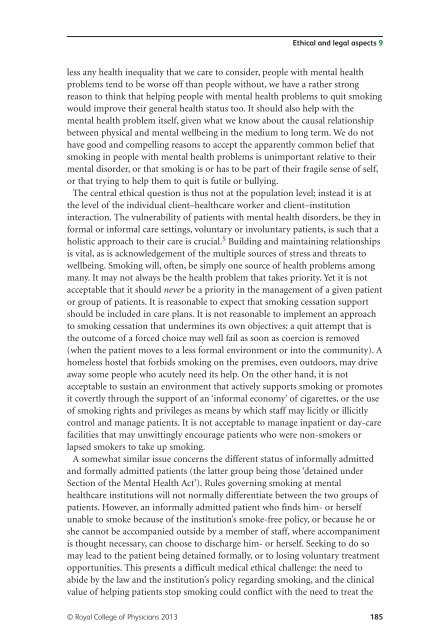Smoking and mental health - NCSCT
Smoking and mental health - NCSCT
Smoking and mental health - NCSCT
You also want an ePaper? Increase the reach of your titles
YUMPU automatically turns print PDFs into web optimized ePapers that Google loves.
Ethical <strong>and</strong> legal aspects 9<br />
less any <strong>health</strong> inequality that we care to consider, people with <strong>mental</strong> <strong>health</strong><br />
problems tend to be worse off than people without, we have a rather strong<br />
reason to think that helping people with <strong>mental</strong> <strong>health</strong> problems to quit smoking<br />
would improve their general <strong>health</strong> status too. It should also help with the<br />
<strong>mental</strong> <strong>health</strong> problem itself, given what we know about the causal relationship<br />
between physical <strong>and</strong> <strong>mental</strong> wellbeing in the medium to long term. We do not<br />
have good <strong>and</strong> compelling reasons to accept the apparently common belief that<br />
smoking in people with <strong>mental</strong> <strong>health</strong> problems is unimportant relative to their<br />
<strong>mental</strong> disorder, or that smoking is or has to be part of their fragile sense of self,<br />
or that trying to help them to quit is futile or bullying.<br />
The central ethical question is thus not at the population level; instead it is at<br />
the level of the individual client–<strong>health</strong>care worker <strong>and</strong> client–institution<br />
interaction. The vulnerability of patients with <strong>mental</strong> <strong>health</strong> disorders, be they in<br />
formal or informal care settings, voluntary or involuntary patients, is such that a<br />
holistic approach to their care is crucial. 5 Building <strong>and</strong> maintaining relationships<br />
is vital, as is acknowledgement of the multiple sources of stress <strong>and</strong> threats to<br />
wellbeing. <strong>Smoking</strong> will, often, be simply one source of <strong>health</strong> problems among<br />
many. It may not always be the <strong>health</strong> problem that takes priority. Yet it is not<br />
acceptable that it should never be a priority in the management of a given patient<br />
or group of patients. It is reasonable to expect that smoking cessation support<br />
should be included in care plans. It is not reasonable to implement an approach<br />
to smoking cessation that undermines its own objectives: a quit attempt that is<br />
the outcome of a forced choice may well fail as soon as coercion is removed<br />
(when the patient moves to a less formal environment or into the community). A<br />
homeless hostel that forbids smoking on the premises, even outdoors, may drive<br />
away some people who acutely need its help. On the other h<strong>and</strong>, it is not<br />
acceptable to sustain an environment that actively supports smoking or promotes<br />
it covertly through the support of an ‘informal economy’ of cigarettes, or the use<br />
of smoking rights <strong>and</strong> privileges as means by which staff may licitly or illicitly<br />
control <strong>and</strong> manage patients. It is not acceptable to manage inpatient or day-care<br />
facilities that may unwittingly encourage patients who were non-smokers or<br />
lapsed smokers to take up smoking.<br />
A somewhat similar issue concerns the different status of informally admitted<br />
<strong>and</strong> formally admitted patients (the latter group being those ‘detained under<br />
Section of the Mental Health Act’). Rules governing smoking at <strong>mental</strong><br />
<strong>health</strong>care institutions will not normally differentiate between the two groups of<br />
patients. However, an informally admitted patient who finds him- or herself<br />
unable to smoke because of the institution’s smoke-free policy, or because he or<br />
she cannot be accompanied outside by a member of staff, where accompaniment<br />
is thought necessary, can choose to discharge him- or herself. Seeking to do so<br />
may lead to the patient being detained formally, or to losing voluntary treatment<br />
opportunities. This presents a difficult medical ethical challenge: the need to<br />
abide by the law <strong>and</strong> the institution’s policy regarding smoking, <strong>and</strong> the clinical<br />
value of helping patients stop smoking could conflict with the need to treat the<br />
© Royal College of Physicians 2013 185














